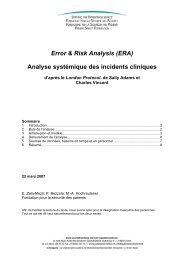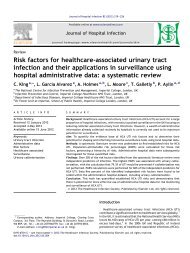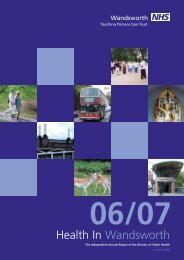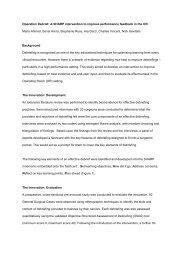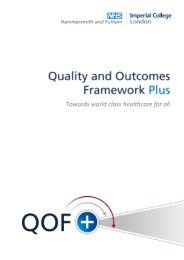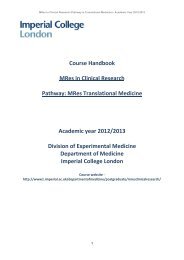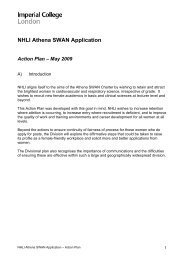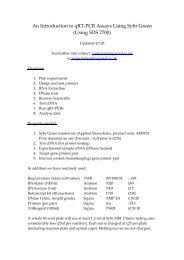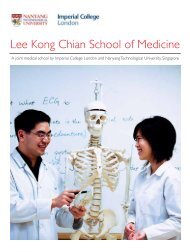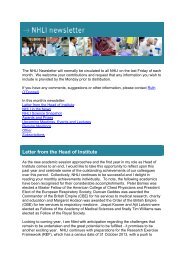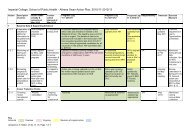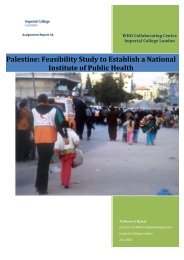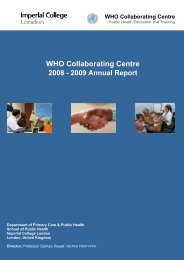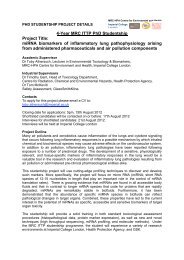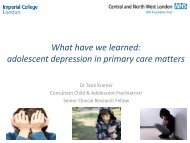Programme Specification for the BSc in Medical Sciences with ...
Programme Specification for the BSc in Medical Sciences with ...
Programme Specification for the BSc in Medical Sciences with ...
You also want an ePaper? Increase the reach of your titles
YUMPU automatically turns print PDFs into web optimized ePapers that Google loves.
<strong>Programme</strong> <strong>Specification</strong> <strong>for</strong> <strong>the</strong> <strong>BSc</strong> <strong>in</strong> <strong>Medical</strong> <strong>Sciences</strong> <strong>with</strong> Cardiovascular <strong>Sciences</strong><br />
<strong>Programme</strong> <strong>Specification</strong> <strong>for</strong> <strong>the</strong> <strong>BSc</strong> <strong>in</strong> <strong>Medical</strong> <strong>Sciences</strong> <strong>with</strong> Cardiovascular <strong>Sciences</strong><br />
PLEASE NOTE. This specification provides a concise summary of <strong>the</strong> ma<strong>in</strong> features of <strong>the</strong><br />
programme and <strong>the</strong> learn<strong>in</strong>g outcomes that a typical student might reasonably be expected to achieve<br />
and demonstrate if he/she takes full advantage of <strong>the</strong> learn<strong>in</strong>g opportunities that are provided. This<br />
specification provides a source of <strong>in</strong><strong>for</strong>mation <strong>for</strong> students and prospective students seek<strong>in</strong>g an<br />
understand<strong>in</strong>g of <strong>the</strong> nature of <strong>the</strong> programme and may be used by <strong>the</strong> College <strong>for</strong> review purposes<br />
and sent to external exam<strong>in</strong>ers. More detailed <strong>in</strong><strong>for</strong>mation on <strong>the</strong> learn<strong>in</strong>g outcomes, content and<br />
teach<strong>in</strong>g, learn<strong>in</strong>g and assessment methods of each module can be found <strong>in</strong> <strong>the</strong> course handbook or<br />
on-l<strong>in</strong>e at https://education.med.imperial.ac.uk/Years/4-1011/cvs/guide.doc. The accuracy of <strong>the</strong><br />
<strong>in</strong><strong>for</strong>mation conta<strong>in</strong>ed <strong>in</strong> this document is reviewed by <strong>the</strong> College and may be checked by <strong>the</strong> Quality<br />
Assurance Agency.<br />
1. Award<strong>in</strong>g Institution: Imperial College London<br />
2. Teach<strong>in</strong>g Institution: Imperial College London<br />
3. External Accreditation by Professional / Statutory Body: Not applicable<br />
4. Name of F<strong>in</strong>al Award (BEng / <strong>BSc</strong> / MEng etc): <strong>BSc</strong> (Honours)<br />
5. <strong>Programme</strong> Title (e.g. Biochemistry <strong>with</strong> Management): <strong>Medical</strong> <strong>Sciences</strong> <strong>with</strong><br />
Cardiovascular <strong>Sciences</strong><br />
6. Name of Department / Division: Undergraduate Medic<strong>in</strong>e<br />
7. Name of Faculty: Faculty of Medic<strong>in</strong>e<br />
8. UCAS Code (or o<strong>the</strong>r cod<strong>in</strong>g system if relevant): A128<br />
9. Relevant QAA Subject Benchmark<strong>in</strong>g Group(s) and/or o<strong>the</strong>r external/<strong>in</strong>ternal reference<br />
po<strong>in</strong>ts: http://www.qaa.ac.uk/academic<strong>in</strong>frastructure/benchmark/honours/medic<strong>in</strong>e.pdf<br />
10. Level(s) of programme <strong>with</strong><strong>in</strong> <strong>the</strong> Framework <strong>for</strong> Higher Education Qualifications (FHEQ):<br />
Bachelor’s (<strong>BSc</strong>, BEng, MBBS) Level 6<br />
Integrated Master’s (MSci, MEng) Levels 6 and 7<br />
Master’s (MSc, MRes) Level 7<br />
11. Mode of Study: Full Time<br />
12. Language of Study: English<br />
13. Date of production / revision of this programme specification (month/year): October 2010<br />
14. Educational aims/objectives of <strong>the</strong> programme:<br />
The programme aims/objectives are to:<br />
• attract motivated students and teach <strong>the</strong>m <strong>in</strong> a way that encourages orig<strong>in</strong>ality of thought and<br />
breadth of vision<br />
• provide a supportive learn<strong>in</strong>g environment, underp<strong>in</strong>ned by world class research<br />
Page 1 of 11
<strong>Programme</strong> <strong>Specification</strong> <strong>for</strong> <strong>the</strong> <strong>BSc</strong> <strong>in</strong> <strong>Medical</strong> <strong>Sciences</strong> <strong>with</strong> Cardiovascular <strong>Sciences</strong><br />
• provide dist<strong>in</strong>ctive modules at each level (Years 3 and 4 of <strong>the</strong> MBBS/<strong>BSc</strong> degree) <strong>with</strong><strong>in</strong><br />
appropriate areas of cardiovascular sciences, draw<strong>in</strong>g on <strong>the</strong> expertise and strengths of our<br />
academic staff<br />
• produce graduates well tra<strong>in</strong>ed <strong>in</strong> laboratory and research skills<br />
• foster <strong>the</strong> ability to work <strong>in</strong>dependently and as part of a group, and to develop presentation skills,<br />
both written and oral<br />
• provide an <strong>in</strong>sight <strong>in</strong>to <strong>the</strong> scientific basis of cardiovascular disease, <strong>in</strong>clud<strong>in</strong>g epidemiological<br />
studies, and <strong>with</strong> rational approaches <strong>for</strong> its treatment<br />
• ensure that students are fully conversant <strong>with</strong> <strong>the</strong> fundamental pr<strong>in</strong>ciples regard<strong>in</strong>g <strong>the</strong> regulation<br />
of <strong>the</strong> cardiovascular system <strong>in</strong> health and disease<br />
15. <strong>Programme</strong> Learn<strong>in</strong>g Outcomes (please list <strong>the</strong> programme learn<strong>in</strong>g outcomes under <strong>the</strong><br />
head<strong>in</strong>gs that follow. Please also list <strong>the</strong> teach<strong>in</strong>g/learn<strong>in</strong>g methods and strategies used to promote<br />
<strong>the</strong> programme learn<strong>in</strong>g outcomes. Module learn<strong>in</strong>g outcomes can be listed <strong>with</strong><strong>in</strong> Module<br />
Handbooks and are not required <strong>for</strong> this section):<br />
Institutions have an obligation to respond to <strong>in</strong>dividual needs and must have due regard to <strong>the</strong> need to<br />
elim<strong>in</strong>ate unlawful disability discrim<strong>in</strong>ation and to promote equality of opportunity. To meet <strong>the</strong><br />
expectations of <strong>the</strong> Disability Equality Duty (DED), <strong>in</strong>stitutions should be pro-active <strong>in</strong> anticipat<strong>in</strong>g <strong>the</strong><br />
variety of possible requirements that disabled students may have, ra<strong>the</strong>r than mak<strong>in</strong>g adjustments <strong>for</strong><br />
students on an ad hoc basis. This document should list all <strong>the</strong> skills needed <strong>for</strong> students to meet <strong>the</strong><br />
learn<strong>in</strong>g outcomes of <strong>the</strong> programme and may be used by <strong>the</strong> College’s Disability Advisory Service<br />
when consider<strong>in</strong>g reasonable adjustments to assessment. You may f<strong>in</strong>d <strong>the</strong> follow<strong>in</strong>g l<strong>in</strong>k to <strong>the</strong><br />
College Disability Advisory Service useful when complet<strong>in</strong>g this section:<br />
http://www3.imperial.ac.uk/disabilityadvisoryservice<br />
1. Knowledge and Understand<strong>in</strong>g<br />
Knowledge and Understand<strong>in</strong>g of:<br />
1. scientific pr<strong>in</strong>ciples, techniques and<br />
approaches available <strong>in</strong> epidemiology,<br />
cl<strong>in</strong>ical medic<strong>in</strong>e, pharmacology,<br />
molecular and cellular sciences relevant<br />
to cardiovascular health and disease;<br />
2. how to <strong>for</strong>mulate hypo<strong>the</strong>ses, what<br />
constitutes good experimental design,<br />
develop<strong>in</strong>g a research plan, <strong>the</strong><br />
pr<strong>in</strong>ciples of analysis and presentation of<br />
scientific<br />
data;<br />
3. critical evaluation of scientific papers;<br />
4. molecular physiology and cell biology of<br />
<strong>the</strong> cardiovascular system;<br />
5. <strong>the</strong> development of <strong>the</strong> cardiovascular<br />
system and <strong>the</strong> pathophysiology of<br />
cardiovascular disease;<br />
6. <strong>the</strong> basic pharmacology of <strong>the</strong><br />
cardiovascular system, and current<br />
<strong>the</strong>rapeutic approaches to<br />
cardiovascular disease;<br />
7. vascular function, microanatomy and cell<br />
biology; cl<strong>in</strong>ical approaches to <strong>the</strong><br />
diagnosis and management of<br />
cardiovascular disease and <strong>the</strong><br />
epidemiology of cardiovascular disease;<br />
Teach<strong>in</strong>g/learn<strong>in</strong>g methods and strategies<br />
Acquisition of 1 - 4 is through a foundation<br />
course dur<strong>in</strong>g <strong>the</strong> first 2 weeks of Year 4<br />
(PART A). Aims 4- 8 are achieved through<br />
more advanced and specialist modules<br />
available <strong>in</strong> Year 4 (PART B & C). Lectures<br />
and research sem<strong>in</strong>ars are an <strong>in</strong>tegral part of<br />
all modules and are supported by a variety of<br />
o<strong>the</strong>r teach<strong>in</strong>g and learn<strong>in</strong>g methods, <strong>in</strong>clud<strong>in</strong>g<br />
tutorials, laboratory work, computer-based<br />
work and coursework.<br />
Throughout, students are encouraged to<br />
undertake <strong>in</strong>dependent read<strong>in</strong>g both to<br />
supplement and consolidate what is be<strong>in</strong>g<br />
taught and learnt, and to broaden <strong>the</strong>ir<br />
knowledge and understand<strong>in</strong>g of <strong>the</strong> subject.<br />
Personal tutorial groups <strong>with</strong> <strong>the</strong> same tutor<br />
throughout PART B to provide opportunities to<br />
re-visit and extend understand<strong>in</strong>g of previously<br />
taught material. Directed learn<strong>in</strong>g <strong>in</strong> <strong>the</strong> <strong>for</strong>m<br />
of small group project work and presentations<br />
are used to foster team work and develop<br />
transferable skills. Independent assignments<br />
<strong>in</strong>clude written and oral presentations, and <strong>the</strong><br />
research project/dissertation.<br />
Assessment of <strong>the</strong> knowledge base is through<br />
a comb<strong>in</strong>ation of unseen written exam<strong>in</strong>ations,<br />
assessed coursework <strong>in</strong> <strong>the</strong> <strong>for</strong>m of essays,<br />
reports, dissertations and presentations, and<br />
<strong>in</strong>dividual research project reports and<br />
presentations.<br />
Page 2 of 11
<strong>Programme</strong> <strong>Specification</strong> <strong>for</strong> <strong>the</strong> <strong>BSc</strong> <strong>in</strong> <strong>Medical</strong> <strong>Sciences</strong> <strong>with</strong> Cardiovascular <strong>Sciences</strong><br />
2. Skills and o<strong>the</strong>r Attributes<br />
Intellectual Skills (lateral and critical<br />
th<strong>in</strong>k<strong>in</strong>g, logic):<br />
Be able to:<br />
1. analyse and solve problems relevant to<br />
<strong>the</strong> cardiovascular system and<br />
cardiovascular disease;<br />
2. <strong>in</strong>tegrate and evaluate <strong>in</strong><strong>for</strong>mation;<br />
3. <strong>for</strong>mulate and test hypo<strong>the</strong>ses us<strong>in</strong>g<br />
appropriate experimental design and<br />
statistical analysis of data;<br />
4. plan, conduct and write-up a programme<br />
of orig<strong>in</strong>al research.<br />
Practical Skills (experimental design, data<br />
analysis, research skills):<br />
Be able to:<br />
1. plan and execute safely a series of<br />
experiments;<br />
2. use laboratory and <strong>in</strong><strong>for</strong>mation–based<br />
technology to generate data and<br />
hypo<strong>the</strong>ses;<br />
3. analyse experimental results and<br />
determ<strong>in</strong>e <strong>the</strong>ir strength and validity;<br />
4. prepare technical reports;<br />
5. give technical presentations;<br />
6. use <strong>the</strong> scientific literature effectively;<br />
7. use computational tools and packages.<br />
Teach<strong>in</strong>g/learn<strong>in</strong>g methods and<br />
strategies<br />
Intellectual skills are developed through <strong>the</strong><br />
teach<strong>in</strong>g and learn<strong>in</strong>g methods outl<strong>in</strong>ed<br />
above and <strong>in</strong> section 1. In<strong>for</strong>mation sift<strong>in</strong>g<br />
and sort<strong>in</strong>g, analysis and problem solv<strong>in</strong>g<br />
skills are promoted through <strong>the</strong> use of group<br />
exercises.<br />
Experimental design and statistical skills are<br />
developed <strong>in</strong> lectures and computer-based<br />
practical work <strong>in</strong> <strong>the</strong> foundation and core<br />
courses and subsequently <strong>in</strong> project work.<br />
Individual, <strong>for</strong>mative and summative<br />
feedback is given to students on all work<br />
produced <strong>in</strong>clud<strong>in</strong>g oral presentations.<br />
Assessment is through coursework, unseen<br />
written exam<strong>in</strong>ations and project work.<br />
Teach<strong>in</strong>g/learn<strong>in</strong>g methods and<br />
strategies<br />
Practical skills are developed through <strong>the</strong><br />
teach<strong>in</strong>g and learn<strong>in</strong>g programme outl<strong>in</strong>ed<br />
above (and <strong>in</strong> section 11).<br />
Practical experimental skills (1 - 3) are<br />
developed through laboratory, computerbased<br />
and project work.<br />
(4) and (5) are taught and developed<br />
through feedback on reports written and<br />
presentations made as part of coursework<br />
assignments.<br />
(6) is developed through lectures,<br />
coursework reports and essays, group<br />
project exercises and <strong>the</strong> <strong>in</strong>dividual<br />
supervised research project.<br />
(7) is taught and developed through<br />
coursework exercises and project work.<br />
Assessment of practical skills is through<br />
laboratory experiment write-ups, coursework<br />
reports and <strong>the</strong> research project dissertation<br />
Transferable Skills (<strong>in</strong>itiative, group work,<br />
<strong>in</strong>dependent thought etc):<br />
Be able to:<br />
1. communicate effectively through oral<br />
presentations, computer process<strong>in</strong>g and<br />
presentations, and written reports;<br />
2. apply statistical skills;<br />
3. work <strong>in</strong>dependently and as part of a<br />
team;<br />
4. <strong>in</strong>tegrate and evaluate <strong>in</strong><strong>for</strong>mation from<br />
a variety of sources;<br />
5. use In<strong>for</strong>mation and Communications<br />
Technology;<br />
6. manage resources and time;<br />
7. learn <strong>in</strong>dependently <strong>with</strong> open-<br />
Teach<strong>in</strong>g/learn<strong>in</strong>g methods and strategies<br />
Transferable skills are developed through<br />
<strong>the</strong> teach<strong>in</strong>g and learn<strong>in</strong>g programme<br />
outl<strong>in</strong>ed above and <strong>in</strong> section 1.<br />
(1) is taught through coursework and<br />
developed through feedback on reports,<br />
essays and oral presentations.<br />
(2).is taught through lectures and practical<br />
work and developed, as appropriate, dur<strong>in</strong>g<br />
<strong>in</strong>dividual research projects.<br />
(3) is developed through coursework,<br />
<strong>in</strong>clud<strong>in</strong>g group project work.<br />
Page 3 of 11
<strong>Programme</strong> <strong>Specification</strong> <strong>for</strong> <strong>the</strong> <strong>BSc</strong> <strong>in</strong> <strong>Medical</strong> <strong>Sciences</strong> <strong>with</strong> Cardiovascular <strong>Sciences</strong><br />
m<strong>in</strong>dedness and critical enquiry;<br />
8. learn effectively <strong>for</strong> <strong>the</strong> purpose of<br />
cont<strong>in</strong>u<strong>in</strong>g professional development.<br />
(4) is developed through tutored<br />
dissertation and <strong>the</strong> research project.<br />
(5) is developed through computer-based<br />
exercises, projects and o<strong>the</strong>r coursework<br />
activities and <strong>in</strong>dividual learn<strong>in</strong>g.<br />
(6) is developed throughout <strong>the</strong> course<br />
<strong>with</strong><strong>in</strong> a framework of staged coursework<br />
deadl<strong>in</strong>es and exam<strong>in</strong>ation system.<br />
Although not explicitly taught, skills<br />
identified <strong>in</strong> (7) and (8) are encouraged and<br />
developed throughout <strong>the</strong> course, which is<br />
structured and delivered <strong>in</strong> such a way as<br />
to promote this.<br />
Assessment of (1) is through coursework,<br />
presentations and written exam<strong>in</strong>ations.<br />
Assessment of (2 – 5) is through<br />
coursework, <strong>in</strong>clud<strong>in</strong>g project work.<br />
Assessment of (4) is also through written<br />
exam<strong>in</strong>ations.<br />
16. The follow<strong>in</strong>g reference po<strong>in</strong>ts were used <strong>in</strong> creat<strong>in</strong>g this programme specification (please<br />
choose from <strong>the</strong> follow<strong>in</strong>g and add any o<strong>the</strong>r external reference po<strong>in</strong>ts used: FHEQ, European Higher<br />
Education Area (EHEA), Course Handbook, Subject Benchmark Statements (where appropriate),<br />
Professional Statutory and Regulatory Bodies (PSRB) documents etc)<br />
• Student Handbook <strong>for</strong> Course;<br />
• QAA guidel<strong>in</strong>es <strong>for</strong> prepar<strong>in</strong>g <strong>Programme</strong> <strong>Specification</strong>s ( www.qaa.ac.uk ).<br />
17. <strong>Programme</strong> structure and features, curriculum units (modules), ECTS assignment and<br />
award requirements (<strong>for</strong> each year of study, please complete <strong>the</strong> structure <strong>for</strong> each term (<strong>in</strong>clud<strong>in</strong>g<br />
what modules or course units will be taken and <strong>in</strong>dicate whe<strong>the</strong>r <strong>the</strong>re are any pre-requisites). Please<br />
also provide <strong>in</strong><strong>for</strong>mation about progression between years. Please <strong>in</strong>dicate whe<strong>the</strong>r placement<br />
activity will apply to your programme, <strong>for</strong> example, year abroad):<br />
The degree programme is offered as a full-time course embedded <strong>with</strong><strong>in</strong> <strong>the</strong> MBBS degree course<br />
and leads to <strong>the</strong> <strong>BSc</strong> Honours Degree <strong>in</strong> <strong>Medical</strong> <strong>Sciences</strong> <strong>with</strong> Cardiovascular <strong>Sciences</strong>. All students<br />
take <strong>the</strong> same MBBS first, second and third year course modules. The Introduction to <strong>the</strong> <strong>BSc</strong> course<br />
is exam<strong>in</strong>ed via <strong>in</strong>-course assessment and year 4 PART B modules 1-3 are exam<strong>in</strong>ed <strong>in</strong> <strong>the</strong> spr<strong>in</strong>g<br />
term. The <strong>BSc</strong> year cont<strong>in</strong>ues <strong>with</strong> students tak<strong>in</strong>g ei<strong>the</strong>r a full-time 10-week <strong>in</strong>dependent research<br />
project, or a specialist course equivalent to 2 modules. Students tak<strong>in</strong>g <strong>the</strong> research project are<br />
assessed by oral presentation, project write-up and per<strong>for</strong>mance dur<strong>in</strong>g <strong>the</strong> project. Students tak<strong>in</strong>g<br />
one of <strong>the</strong> three available specialist courses are assessed by oral presentation, m<strong>in</strong>i-project write-up,<br />
and per<strong>for</strong>mance dur<strong>in</strong>g <strong>the</strong> m<strong>in</strong>i-project.<br />
Year One: Not applicable<br />
Term one:<br />
Term Two:<br />
Term Three:<br />
Year Two (if applicable): Not applicable<br />
Term one:<br />
Term Two:<br />
Page 4 of 11
<strong>Programme</strong> <strong>Specification</strong> <strong>for</strong> <strong>the</strong> <strong>BSc</strong> <strong>in</strong> <strong>Medical</strong> <strong>Sciences</strong> <strong>with</strong> Cardiovascular <strong>Sciences</strong><br />
Term Three:<br />
Year Three (if applicable):<br />
Term one: 2-week <strong>BSc</strong> Foundation course <strong>in</strong> Cardiopulmonary <strong>Sciences</strong> <strong>with</strong> <strong>the</strong> follow<strong>in</strong>g aims and<br />
objectives:<br />
• Analyse and <strong>in</strong>terpret data, us<strong>in</strong>g relevant statistics where appropriate<br />
• Understand <strong>the</strong> concept of develop<strong>in</strong>g and test<strong>in</strong>g a hypo<strong>the</strong>sis<br />
• Understand <strong>the</strong> pr<strong>in</strong>ciples of experimental design<br />
• Understand <strong>the</strong> concept of plagiarism and how to avoid it<br />
• Have had experience of written scientific communication<br />
• Understand <strong>the</strong> fundamental pr<strong>in</strong>ciples and practice of scientific research<br />
• Appreciate <strong>the</strong> legal and ethical issues surround<strong>in</strong>g scientific research<br />
• Critically review scientific literature<br />
Term Two:<br />
Term Three:<br />
Year Four (if applicable):<br />
PART A<br />
A 2-week <strong>BSc</strong> Foundation course <strong>in</strong> Cardiopulmonary <strong>Sciences</strong> <strong>with</strong> <strong>the</strong> follow<strong>in</strong>g aims and<br />
objectives:<br />
• Understand how to analyse and <strong>in</strong>terpret data, us<strong>in</strong>g relevant statistics where appropriate<br />
• Understand <strong>the</strong> concept of develop<strong>in</strong>g and test<strong>in</strong>g a hypo<strong>the</strong>sis<br />
• Understand <strong>the</strong> pr<strong>in</strong>ciples of experimental design<br />
• Understand <strong>the</strong> concept of plagiarism and how to avoid it<br />
• Ga<strong>in</strong> experience of written scientific communications<br />
• Understand <strong>the</strong> fundamental pr<strong>in</strong>ciples and practice of scientific research<br />
• Appreciate <strong>the</strong> legal and ethical issues surround<strong>in</strong>g scientific research<br />
• Understand how to critically review scientific literature<br />
PART B<br />
A course compris<strong>in</strong>g 3 taught modules:<br />
Term One: Students commence <strong>with</strong> <strong>the</strong> module of Molecular and Cellular Cardiology <strong>in</strong> <strong>the</strong><br />
autumn term (Module 1), which addresses <strong>the</strong> structure, development and electrophysiological<br />
properties of <strong>the</strong> heart, <strong>the</strong> cellular basis of excitation-contraction coupl<strong>in</strong>g, and <strong>the</strong> novel and<br />
develop<strong>in</strong>g technologies and regenerative approaches <strong>for</strong> treatment of heart disease and cardiac<br />
failure. This is followed by a module <strong>in</strong> Vascular Biology & Cardiovascular Pharmacology (Module<br />
2) which occupies <strong>the</strong> rema<strong>in</strong>der of <strong>the</strong> autumn term. This module <strong>in</strong>troduces <strong>the</strong> physiology of<br />
vasculature, biology of vascular diseases and <strong>the</strong> basic pharmacology of <strong>the</strong> cardiovascular system,<br />
<strong>in</strong>clud<strong>in</strong>g on sub-cellular and cellular level.<br />
Term Two: The f<strong>in</strong>al module of Cardiovascular disease epidemiology, <strong>in</strong>vestigation and<br />
<strong>the</strong>rapeutics (Module 3) occupies <strong>the</strong> first half of <strong>the</strong> spr<strong>in</strong>g term and addresses <strong>the</strong> determ<strong>in</strong>ants,<br />
distribution, prevention and treatment management of cardiovascular diseases, epidemiological<br />
approaches to study<strong>in</strong>g cardiovascular diseases, and <strong>in</strong>troduction to imag<strong>in</strong>g techniques <strong>for</strong><br />
assessment of healthy and diseased cardiovascular system.<br />
Dur<strong>in</strong>g <strong>the</strong> latter part of this term, <strong>the</strong> students are exam<strong>in</strong>ed on core modules 1 – 3. After complet<strong>in</strong>g<br />
<strong>the</strong>ir exam<strong>in</strong>ations, students commence PART C consist<strong>in</strong>g of a research project or specialist taught<br />
course.<br />
Page 5 of 11
<strong>Programme</strong> <strong>Specification</strong> <strong>for</strong> <strong>the</strong> <strong>BSc</strong> <strong>in</strong> <strong>Medical</strong> <strong>Sciences</strong> <strong>with</strong> Cardiovascular <strong>Sciences</strong><br />
Term Three: The summer term commences <strong>with</strong> cont<strong>in</strong>uation of PART C (<strong>the</strong> research project or<br />
specialist course). At <strong>the</strong> end of <strong>the</strong> research project or specialist course, students are assessed by<br />
an oral presentation of <strong>the</strong>ir studies, a project write-up of approximately 5000 words or a m<strong>in</strong>i-project<br />
write-up of up to 6000 words, respectively, and <strong>the</strong> per<strong>for</strong>mance of <strong>the</strong> student dur<strong>in</strong>g <strong>the</strong> project/m<strong>in</strong>iproject.<br />
18. Support provided to students to assist learn<strong>in</strong>g (<strong>in</strong>clud<strong>in</strong>g collaborative students, where<br />
appropriate). (The description should <strong>in</strong>clude <strong>in</strong><strong>for</strong>mation about <strong>the</strong> <strong>in</strong>duction programme, welfare<br />
and pastoral support, library and o<strong>the</strong>r facilities available to students, personal tutor<strong>in</strong>g, and access to<br />
teach<strong>in</strong>g and learn<strong>in</strong>g support services, English language support, feedback to students and<br />
dissem<strong>in</strong>ation of actions taken as a result):<br />
• A pr<strong>in</strong>ted and bound course guide which provides more detailed <strong>in</strong><strong>for</strong>mation on <strong>the</strong> course<br />
also published electronically on <strong>the</strong> on <strong>the</strong> Medic<strong>in</strong>e Undergraduate Teach<strong>in</strong>g Intranet.<br />
• Pr<strong>in</strong>ted hand-outs <strong>for</strong> lectures, also available as Powerpo<strong>in</strong>t slides on <strong>the</strong> Medic<strong>in</strong>e<br />
Undergraduate Teach<strong>in</strong>g Intranet.<br />
• Miscellaneous resources on <strong>the</strong> Medic<strong>in</strong>e Undergraduate Teach<strong>in</strong>g Intranet.<br />
• Additional <strong>in</strong><strong>for</strong>mation provided on Faculty/Department Intranet.<br />
• Extensive library (7-day, 24h open<strong>in</strong>g <strong>in</strong> term time) and o<strong>the</strong>r learn<strong>in</strong>g resources and<br />
facilities at South Kens<strong>in</strong>gton campus.<br />
• Specialist Cardiopulmonary library at Guy Scadd<strong>in</strong>g Build<strong>in</strong>g, NHLI Division, Dovehouse<br />
Street.<br />
• Dedicated comput<strong>in</strong>g, pr<strong>in</strong>t<strong>in</strong>g and copy<strong>in</strong>g facilities (<strong>in</strong>clud<strong>in</strong>g scann<strong>in</strong>g) <strong>with</strong> extended<br />
daily access , and provid<strong>in</strong>g e-mail, on-l<strong>in</strong>e journals, journal databases (e.g. Web of<br />
Science, Medl<strong>in</strong>e). Log-on facility (VPN) from outside College.<br />
• Modern teach<strong>in</strong>g laboratories and access, where appropriate, to adjacent research<br />
facilities.<br />
• Personal academic tutor<strong>in</strong>g <strong>in</strong> small groups students <strong>with</strong> <strong>the</strong> same tutor <strong>for</strong> each group on<br />
a regular basis throughout PART B.<br />
• A personal welfare tutor assigned to all students <strong>for</strong> <strong>the</strong> duration of <strong>the</strong> <strong>BSc</strong> Honours year.<br />
• Timely written feedback on coursework to students <strong>with</strong> fur<strong>the</strong>r opportunities <strong>for</strong> <strong>in</strong>dividual<br />
discussion of matters aris<strong>in</strong>g.<br />
• Student feedback on <strong>the</strong> taught course and teach<strong>in</strong>g quality through Student Onl<strong>in</strong>e<br />
Evaluation (SOLE)<br />
• A staff - student liaison group.<br />
• Weekly NHLI Research Sem<strong>in</strong>ar Series, which students are encouraged to attend.<br />
• Student email and open personal access to tutorial staff <strong>in</strong>clud<strong>in</strong>g <strong>the</strong> Course Director,<br />
Module Leaders and <strong>the</strong> Deputy Head of Department (Teach<strong>in</strong>g).<br />
• Access to <strong>the</strong> Officers of <strong>the</strong> Medics Student Union (based <strong>in</strong> <strong>the</strong> Sir Alexander Flem<strong>in</strong>g<br />
Build<strong>in</strong>g).<br />
• Access to Senior Welfare Tutor <strong>for</strong> Year 4 (<strong>BSc</strong>), Faculty of Medic<strong>in</strong>e.<br />
• Access to <strong>the</strong> Director of Education Medic<strong>in</strong>e.<br />
• The Faculty Education Office (FEO) who provide a first po<strong>in</strong>t of contact <strong>for</strong> all matters<br />
concern<strong>in</strong>g students.<br />
• Access to student counsellors on <strong>the</strong> South Kens<strong>in</strong>gton site.<br />
• Access to Teach<strong>in</strong>g and Learn<strong>in</strong>g Support Services, which provide assistance and<br />
guidance, e.g. on careers.<br />
• Opportunities <strong>for</strong> students to conduct <strong>the</strong>ir F<strong>in</strong>al Year Research Projects <strong>in</strong> o<strong>the</strong>r<br />
Departments/Centres <strong>with</strong><strong>in</strong> Imperial College.<br />
19. Criteria <strong>for</strong> admission:<br />
All students will have met <strong>the</strong> m<strong>in</strong>imum entrance requirements <strong>for</strong> <strong>the</strong> School of Medic<strong>in</strong>e MBBS/<strong>BSc</strong><br />
programme and have successfully completed years 1 and 2 and <strong>the</strong> <strong>BSc</strong> Foundation Course (Part A)<br />
of <strong>the</strong> course.<br />
20. Processes used to select students:<br />
The selection of students <strong>for</strong> <strong>the</strong> <strong>BSc</strong> operates via student <strong>BSc</strong> choice submission and allocation of<br />
<strong>the</strong> students to <strong>BSc</strong> based on <strong>the</strong>ir submitted choices and academic per<strong>for</strong>mance <strong>in</strong> Years 1 and 2. A<br />
<strong>BSc</strong> Appeals procedure is <strong>in</strong> place to ensure that students unsatisfied <strong>with</strong> <strong>the</strong>ir orig<strong>in</strong>al <strong>BSc</strong> choice<br />
Page 6 of 11
<strong>Programme</strong> <strong>Specification</strong> <strong>for</strong> <strong>the</strong> <strong>BSc</strong> <strong>in</strong> <strong>Medical</strong> <strong>Sciences</strong> <strong>with</strong> Cardiovascular <strong>Sciences</strong><br />
and allocation can be considered <strong>for</strong> re-allocation to ano<strong>the</strong>r course, subject to available places and<br />
satisfactory academic per<strong>for</strong>mance.<br />
21. Methods <strong>for</strong> evaluat<strong>in</strong>g and improv<strong>in</strong>g <strong>the</strong> quality and standards of teach<strong>in</strong>g and learn<strong>in</strong>g<br />
In<strong>for</strong>mation regard<strong>in</strong>g College-level practices is outl<strong>in</strong>ed below. Please amend this as appropriate to<br />
<strong>in</strong>corporate details of departmental activity.<br />
a) Methods <strong>for</strong> review and evaluation of teach<strong>in</strong>g, learn<strong>in</strong>g, assessment, <strong>the</strong> curriculum and<br />
outcome standards:<br />
The external exam<strong>in</strong>er system and Boards of Exam<strong>in</strong>ers are central to <strong>the</strong> process by which <strong>the</strong><br />
College monitors <strong>the</strong> reliability and validity of its assessment procedures and academic standards.<br />
Boards of Exam<strong>in</strong>ers comment on <strong>the</strong> assessment procedures <strong>with</strong><strong>in</strong> <strong>the</strong> College and may suggest<br />
improvements <strong>for</strong> action by relevant departmental teach<strong>in</strong>g Committees.<br />
The Faculty Studies Committees review and consider <strong>the</strong> reports of external exam<strong>in</strong>ers and<br />
accredit<strong>in</strong>g bodies and conduct periodic (normally qu<strong>in</strong>quennial) and <strong>in</strong>ternal reviews of teach<strong>in</strong>g<br />
provision. Regular reviews ensure that <strong>the</strong>re is opportunity to highlight examples of good practice and<br />
ensure that recommendations <strong>for</strong> improvement can be made.<br />
At programme level, <strong>the</strong> Head of Department/Division has overall responsibility <strong>for</strong> academic<br />
standards and <strong>the</strong> quality of <strong>the</strong> educational experience delivered <strong>with</strong><strong>in</strong> <strong>the</strong> department or division.<br />
Most of <strong>the</strong> College’s undergraduate programmes are accredited by professional eng<strong>in</strong>eer<strong>in</strong>g and<br />
science bodies or by <strong>the</strong> General <strong>Medical</strong> Council. Accreditation provides <strong>the</strong> College <strong>with</strong> additional<br />
assurance that its programmes are of an appropriate standard and relevant to <strong>the</strong> requirement of<br />
<strong>in</strong>dustry and <strong>the</strong> professions.<br />
Mechanisms <strong>for</strong> evaluation of teach<strong>in</strong>g, learn<strong>in</strong>g, assessment, <strong>the</strong> curriculum and outcome<br />
standards<br />
• Annual course review undertaken by <strong>the</strong> Faculty of Medic<strong>in</strong>e <strong>BSc</strong> Quality Assurance group<br />
of <strong>the</strong> Education Committee Year 4 – <strong>BSc</strong>. The review will be considered by <strong>the</strong><br />
Education Committee Year 4 – <strong>BSc</strong> and will cover all aspects of <strong>the</strong> course <strong>in</strong>clud<strong>in</strong>g<br />
progression and degree statistics, External Exam<strong>in</strong>er Reports, student feedback and peer<br />
review [see below], feedback from module leaders and o<strong>the</strong>r staff.<br />
• Staff – Student Liaison Group Year 4.<br />
• College Student On-L<strong>in</strong>e Lecturer Evaluation (SOLE) and <strong>in</strong>-house course questionnaires<br />
and feedback sessions organised by module convenors.<br />
• Biennial staff appraisals by Section Heads, reviewed by <strong>the</strong> Head of Department.<br />
• Peer teach<strong>in</strong>g observations, which are monitored by <strong>the</strong> Deputy Head of Department<br />
(Teach<strong>in</strong>g).<br />
• External Exam<strong>in</strong>er reports.<br />
• Departmental Teach<strong>in</strong>g Strategy Committee<br />
• <strong>Medical</strong> <strong>Sciences</strong> <strong>with</strong> Cardiovascular <strong>Sciences</strong> <strong>BSc</strong> committee, compris<strong>in</strong>g all module<br />
leaders and <strong>the</strong> course director, which meets at least termly and evaluates feedback from<br />
students and <strong>for</strong>mulates appropriate actions.<br />
• Review by <strong>the</strong> Quality Assurance Agency.<br />
• Reviews by <strong>the</strong> GMC.<br />
b) Committees <strong>with</strong> responsibility <strong>for</strong> monitor<strong>in</strong>g and evaluat<strong>in</strong>g quality and standards:<br />
The Senate oversees <strong>the</strong> quality assurance and regulation of degrees offered by <strong>the</strong> College. It is<br />
charged <strong>with</strong> promot<strong>in</strong>g <strong>the</strong> academic work of <strong>the</strong> College, both <strong>in</strong> teach<strong>in</strong>g and research, and <strong>with</strong><br />
regulat<strong>in</strong>g and supervis<strong>in</strong>g <strong>the</strong> education and discipl<strong>in</strong>e of <strong>the</strong> students of <strong>the</strong> College. It has<br />
responsibility <strong>for</strong> approval of changes to <strong>the</strong> Academic Regulations, major changes to degree<br />
programmes and approval of new programmes.<br />
The Quality Assurance Advisory Committee (QAAC) is <strong>the</strong> ma<strong>in</strong> <strong>for</strong>um <strong>for</strong> discussion of QA policy<br />
and <strong>the</strong> regulation of degree programmes at College level. QAAC develops and advises <strong>the</strong> Senate<br />
on <strong>the</strong> implementation of codes of practice and procedures relat<strong>in</strong>g to quality assurance and audit of<br />
quality and arrangements necessary to ensure compliance <strong>with</strong> national and <strong>in</strong>ternational standards.<br />
Page 7 of 11
<strong>Programme</strong> <strong>Specification</strong> <strong>for</strong> <strong>the</strong> <strong>BSc</strong> <strong>in</strong> <strong>Medical</strong> <strong>Sciences</strong> <strong>with</strong> Cardiovascular <strong>Sciences</strong><br />
QAAC also considers amendments to <strong>the</strong> Academic Regulations be<strong>for</strong>e mak<strong>in</strong>g recommendations <strong>for</strong><br />
change to <strong>the</strong> Senate. It also ma<strong>in</strong>ta<strong>in</strong>s an overview of <strong>the</strong> statistics on completion rates,<br />
<strong>with</strong>drawals, exam<strong>in</strong>ation irregularities (<strong>in</strong>clud<strong>in</strong>g cases of plagiarism), student appeals and<br />
discipl<strong>in</strong>ary issues.<br />
The Faculty Studies Committees are <strong>the</strong> major vehicle <strong>for</strong> <strong>the</strong> quality assurance of courses. Their<br />
remit <strong>in</strong>cludes: sett<strong>in</strong>g <strong>the</strong> standards and framework, and oversee<strong>in</strong>g <strong>the</strong> processes of quality<br />
assurance, <strong>for</strong> <strong>the</strong> areas <strong>with</strong><strong>in</strong> <strong>the</strong>ir remit; monitor<strong>in</strong>g <strong>the</strong> provision and quality of e-learn<strong>in</strong>g;<br />
undertak<strong>in</strong>g reviews of new and exist<strong>in</strong>g courses; not<strong>in</strong>g m<strong>in</strong>or changes <strong>in</strong> exist<strong>in</strong>g programme<br />
curricula approved by Departments; approv<strong>in</strong>g new modules, changes <strong>in</strong> module titles, major changes<br />
<strong>in</strong> exam<strong>in</strong>ation structure and programme specifications <strong>for</strong> exist<strong>in</strong>g programmes; and review<strong>in</strong>g<br />
proposals <strong>for</strong> new programmes, and <strong>the</strong> discont<strong>in</strong>uation of exist<strong>in</strong>g programmes, and mak<strong>in</strong>g<br />
recommendations to Senate as appropriate.<br />
The Faculty Teach<strong>in</strong>g Committees ma<strong>in</strong>ta<strong>in</strong> and develop teach<strong>in</strong>g strategies and promote <strong>in</strong>terdepartmental<br />
and <strong>in</strong>ter-faculty teach<strong>in</strong>g activities to enhance <strong>the</strong> efficiency of teach<strong>in</strong>g <strong>with</strong><strong>in</strong><br />
Faculties. They also identify and dissem<strong>in</strong>ate examples of good practice <strong>in</strong> teach<strong>in</strong>g.<br />
Departmental Teach<strong>in</strong>g Committees have responsibility <strong>for</strong> <strong>the</strong> approval of m<strong>in</strong>or changes to<br />
course curricula and exam<strong>in</strong>ation structures and approve arrangements <strong>for</strong> course work. They also<br />
consider <strong>the</strong> details of entrance requirements and determ<strong>in</strong>e departmental postgraduate student<br />
numbers. The Faculty Studies Committees receive regular reports from <strong>the</strong> Departmental Teach<strong>in</strong>g<br />
Committees.<br />
Committees <strong>with</strong> responsibility <strong>for</strong> monitor<strong>in</strong>g and evaluat<strong>in</strong>g quality and standards<br />
• Staff – Student Liaison Group Year 4.<br />
• Faculty of Medic<strong>in</strong>e <strong>BSc</strong> Quality Assurance group.<br />
• Faculty of Medic<strong>in</strong>e Education Committee Year 4 – <strong>BSc</strong>.<br />
• <strong>Medical</strong> Studies Committee.<br />
• Divisional Teach<strong>in</strong>g Strategy Committee.<br />
• Board and Sub-Board of Exam<strong>in</strong>ers – meets to consider f<strong>in</strong>al degrees.<br />
• Exam<strong>in</strong>ations and Assessments Committee.<br />
• College Undergraduate Studies Committee.<br />
• College Quality Assurance Committee (<strong>with</strong> student representation).<br />
• Imperial College, Senate<br />
c) Mechanisms <strong>for</strong> provid<strong>in</strong>g prompt feedback to students on <strong>the</strong>ir per<strong>for</strong>mance <strong>in</strong> course<br />
work and exam<strong>in</strong>ations and processes <strong>for</strong> monitor<strong>in</strong>g that <strong>the</strong>se named processes are<br />
effective:<br />
The follow<strong>in</strong>g regulations and guidel<strong>in</strong>es <strong>for</strong> feedback on student per<strong>for</strong>mance apply:<br />
• There is no def<strong>in</strong>itive College rul<strong>in</strong>g on <strong>the</strong> means of provid<strong>in</strong>g assessment results <strong>for</strong><br />
coursework o<strong>the</strong>r than that that marks should be released to students after confirmation by<br />
<strong>the</strong> Board of Exam<strong>in</strong>ers. Course tutors should ensure that <strong>the</strong> students are given<br />
appropriate feedback on <strong>the</strong>ir work by issu<strong>in</strong>g marks <strong>in</strong>dicative of <strong>the</strong> boundaries <strong>with</strong><strong>in</strong><br />
which <strong>the</strong> actual marks fall (i.e. first class; upper second; lower second; third; pass; fail)<br />
accord<strong>in</strong>g to <strong>the</strong> follow<strong>in</strong>g criteria:<br />
• Marks should only be given <strong>for</strong> coursework which contributes to <strong>the</strong> assessment of a<br />
discrete course element, e.g. practical write-ups, coursework essays.<br />
• Marks should not be issued <strong>for</strong> major discrete course elements, e.g. f<strong>in</strong>al year projects and<br />
dissertations prior to <strong>the</strong> meet<strong>in</strong>g of <strong>the</strong> Board of Exam<strong>in</strong>ers. Detailed <strong>in</strong><strong>for</strong>mation of marks<br />
<strong>for</strong> elements of <strong>for</strong>mal exam<strong>in</strong>ations (Part B) can only be released to a student after he/she<br />
had submitted a request under <strong>the</strong> Freedom of In<strong>for</strong>mation Act to Registry that is liable to<br />
a fee. Granted requests allow <strong>the</strong> student access to his/her script under supervision by a<br />
member of <strong>the</strong> FEO. The granted requests do not allow copy<strong>in</strong>g of documents or<br />
subsequent discussion of assigned marks <strong>with</strong> exam<strong>in</strong>ers.<br />
• Marks <strong>for</strong> any element of work should be released simultaneously to <strong>the</strong> entire cohort of<br />
students after undergo<strong>in</strong>g departmental moderation procedure<br />
Page 8 of 11
<strong>Programme</strong> <strong>Specification</strong> <strong>for</strong> <strong>the</strong> <strong>BSc</strong> <strong>in</strong> <strong>Medical</strong> <strong>Sciences</strong> <strong>with</strong> Cardiovascular <strong>Sciences</strong><br />
• Students must be <strong>in</strong><strong>for</strong>med that all marks released are provisional until confirmed by <strong>the</strong><br />
Board of Exam<strong>in</strong>ers. Any noted justifications <strong>for</strong> issued marks should be ma<strong>in</strong>ta<strong>in</strong>ed <strong>for</strong> at<br />
least a year.<br />
• Coursework should normally be marked and returned to provide feedback <strong>with</strong><strong>in</strong> two<br />
weeks of <strong>the</strong> deadl<strong>in</strong>e <strong>for</strong> submission.<br />
• As good practice, it is recommended that <strong>the</strong> <strong>BSc</strong> courses use an approved In-course<br />
Assessment Feedback <strong>for</strong>m <strong>for</strong> feedback on student per<strong>for</strong>mance <strong>in</strong> <strong>the</strong> <strong>in</strong>-course<br />
assessment of <strong>the</strong> Introduction to <strong>the</strong> <strong>BSc</strong> course, Part B modules, Specialist course<br />
Module 4 and <strong>the</strong> <strong>BSc</strong> Foundation course.<br />
d) Mechanisms <strong>for</strong> ga<strong>in</strong><strong>in</strong>g student feedback on <strong>the</strong> quality of teach<strong>in</strong>g and <strong>the</strong>ir learn<strong>in</strong>g<br />
experience and how students are provided <strong>with</strong> feedback as to actions taken as a result of<br />
<strong>the</strong>ir comments:<br />
• Staff – Student Liaison Group Year 4.<br />
• Faculty of Medic<strong>in</strong>e Education Committee Year 4 – <strong>BSc</strong> - student representative.<br />
• Feedback sessions <strong>for</strong> each module and SOLE<br />
• Faculty Education Office, Personal Tutors, Senior Welfare Tutor <strong>for</strong> <strong>the</strong> <strong>BSc</strong> (FoM),<br />
Course Directors and Module Leaders.<br />
• Vivas <strong>with</strong> External Exam<strong>in</strong>ers.<br />
e) Mechanisms <strong>for</strong> monitor<strong>in</strong>g <strong>the</strong> effectiveness of <strong>the</strong> personal tutor<strong>in</strong>g system:<br />
The <strong>BSc</strong> Welfare Tutor<strong>in</strong>g system, <strong>in</strong>troduced from 2009/10, is designed to cater <strong>for</strong> <strong>the</strong> welfare<br />
needs of <strong>BSc</strong> students com<strong>in</strong>g off <strong>the</strong> cl<strong>in</strong>ical Year 3. In Year 4, <strong>the</strong> <strong>BSc</strong> students will reta<strong>in</strong> <strong>the</strong>ir<br />
cl<strong>in</strong>ical tutor but will also have an allocated <strong>BSc</strong> course tutor. The <strong>BSc</strong> Welfare tutor<strong>in</strong>g system will be<br />
overseen by <strong>the</strong> Senior Welfare Tutor <strong>for</strong> <strong>the</strong> <strong>BSc</strong> <strong>in</strong> <strong>the</strong> Faculty of Medic<strong>in</strong>e, <strong>the</strong> Director of<br />
Education, and <strong>the</strong> established committee structure <strong>for</strong> <strong>the</strong> <strong>BSc</strong>, beg<strong>in</strong>n<strong>in</strong>g <strong>with</strong> <strong>the</strong> Staff-Student<br />
Liaison Group - Year 4 (SSLG 4).<br />
f) Mechanisms <strong>for</strong> recognis<strong>in</strong>g and reward<strong>in</strong>g excellence <strong>in</strong> teach<strong>in</strong>g and <strong>in</strong> pastoral care:<br />
Staff are encouraged to reflect on <strong>the</strong>ir teach<strong>in</strong>g, <strong>in</strong> order to <strong>in</strong>troduce enhancements and develop<br />
<strong>in</strong>novative teach<strong>in</strong>g methods. Each year College awards are presented to academic staff <strong>for</strong><br />
outstand<strong>in</strong>g contributions to teach<strong>in</strong>g, pastoral care or research supervision. A special award <strong>for</strong><br />
Teach<strong>in</strong>g Innovation, available each year, is presented to a member of staff who has demonstrated<br />
an orig<strong>in</strong>al and <strong>in</strong>novative approach to teach<strong>in</strong>g. Nom<strong>in</strong>ations <strong>for</strong> <strong>the</strong>se awards come from across <strong>the</strong><br />
College and students are <strong>in</strong>vited both to nom<strong>in</strong>ate staff and to sit on <strong>the</strong> decid<strong>in</strong>g panels.<br />
g) Staff development priorities <strong>for</strong> this programme <strong>in</strong>clude:<br />
• College and Faculty of Medic<strong>in</strong>e Staff Development Courses;<br />
• staff appraisal scheme and <strong>in</strong>stitutional staff development courses;<br />
• active encouragement of membership of <strong>the</strong> ILTHE; new Lecturers are encouraged to take<br />
<strong>the</strong> Certificate of Advanced Study <strong>in</strong> Learn<strong>in</strong>g and Teach<strong>in</strong>g [CASLAT] run by <strong>the</strong> Imperial<br />
College Centre <strong>for</strong> Educational Development;<br />
• College Teach<strong>in</strong>g Development and Teach<strong>in</strong>g Research Grant Schemes to fund <strong>the</strong><br />
development of, and research <strong>in</strong>to, new teach<strong>in</strong>g and appraisal methods;<br />
• Updat<strong>in</strong>g professional and IT/comput<strong>in</strong>g developments.<br />
22. Regulation of Assessment (you may f<strong>in</strong>d <strong>the</strong> follow<strong>in</strong>g l<strong>in</strong>k useful when complet<strong>in</strong>g this section:<br />
http://www3.imperial.ac.uk/registry/<strong>in</strong><strong>for</strong>mation/academicregulations)<br />
a) Assessment Rules and Degree Classification:<br />
For undergraduate programmes classification of degrees will be accord<strong>in</strong>g to <strong>the</strong> follow<strong>in</strong>g range of<br />
marks:<br />
First class 70 - 100%<br />
Second class (upper division) 60 - 69.9%<br />
Second class (lower division) 50 - 59.9%<br />
Third class 40 - 49.9%<br />
Page 9 of 11
<strong>Programme</strong> <strong>Specification</strong> <strong>for</strong> <strong>the</strong> <strong>BSc</strong> <strong>in</strong> <strong>Medical</strong> <strong>Sciences</strong> <strong>with</strong> Cardiovascular <strong>Sciences</strong><br />
Where appropriate, a Board of Exam<strong>in</strong>ers may award a result of merit where a candidate has<br />
achieved an aggregate mark of 60% or greater across <strong>the</strong> programme as a whole AND has obta<strong>in</strong>ed<br />
a mark of 60% or greater <strong>in</strong> each element <strong>with</strong> <strong>the</strong> exception of one element AND has obta<strong>in</strong>ed a<br />
mark of 50% or greater <strong>in</strong> this latter element.<br />
Where appropriate, a Board of Exam<strong>in</strong>ers may award a result of dist<strong>in</strong>ction where a candidate has<br />
achieved an aggregate mark of 70% or greater across <strong>the</strong> programme as a whole AND has obta<strong>in</strong>ed<br />
a mark of 70% or greater <strong>in</strong> each element <strong>with</strong> <strong>the</strong> exception of one element AND has obta<strong>in</strong>ed a<br />
mark of 60% or greater <strong>in</strong> this latter element.<br />
Assessment <strong>in</strong> <strong>the</strong> <strong>BSc</strong> <strong>in</strong> <strong>Medical</strong> <strong>Sciences</strong> <strong>with</strong> Cardiovascular <strong>Sciences</strong><br />
Part A, <strong>the</strong> Introducton to <strong>the</strong> <strong>BSc</strong> course, is assessed via one compulsory piece of <strong>in</strong>-course<br />
assessment, <strong>the</strong> type of which is at <strong>the</strong> discretion of <strong>the</strong> course. This coursework does not contribute<br />
to <strong>the</strong> <strong>BSc</strong> degree but is compyulsory to submit.<br />
The <strong>BSc</strong>, Part B, is assessed via <strong>in</strong>-course assessment – 2 compulsory pieces <strong>for</strong> each of <strong>the</strong> three<br />
Part B modules, contribut<strong>in</strong>g a total of 30% of <strong>the</strong> module’s mark, and a written exam<strong>in</strong>ation paper,<br />
part of <strong>the</strong> Part B exam<strong>in</strong>ations, contribut<strong>in</strong>g 70% of <strong>the</strong> overall module mark.<br />
Part C of <strong>the</strong> <strong>BSc</strong> is assessed 1) <strong>for</strong> students undertak<strong>in</strong>g a <strong>BSc</strong> Project: via a project write-up,<br />
contribut<strong>in</strong>g 70% to <strong>the</strong> overall Part C mark, an oral presentation of <strong>the</strong> project, contribut<strong>in</strong>g 20% of<br />
<strong>the</strong> overall Part C mark, and a mark of <strong>the</strong> per<strong>for</strong>mance of <strong>the</strong> student dur<strong>in</strong>g <strong>the</strong> project, contribut<strong>in</strong>g<br />
10% of <strong>the</strong> overall Part C mark; and 2) <strong>for</strong> students undertak<strong>in</strong>g a specialist course: via <strong>in</strong>-course<br />
assessment – two pieces contribut<strong>in</strong>g a total of 40% (20% each) of <strong>the</strong> overall Part C mark, a m<strong>in</strong>iproject<br />
write-up, contribut<strong>in</strong>g 30% of <strong>the</strong> overall Part C mark, an oral presentation of <strong>the</strong> m<strong>in</strong>i-project,<br />
contribut<strong>in</strong>g 20% of <strong>the</strong> overall Part C mark, and a mark of <strong>the</strong> per<strong>for</strong>mance of <strong>the</strong> student dur<strong>in</strong>g <strong>the</strong><br />
m<strong>in</strong>i-project, contribut<strong>in</strong>g 10% of <strong>the</strong> overall Part C mark.<br />
b) Mark<strong>in</strong>g Schemes <strong>for</strong> undergraduate and postgraduate taught programmes:<br />
The Pass Mark <strong>for</strong> all undergraduate modules is 40%. From October 2008 entry all undergraduates<br />
are required to pass all <strong>the</strong>ir course units <strong>in</strong> order to progress to <strong>the</strong> next year.<br />
c) Processes <strong>for</strong> deal<strong>in</strong>g <strong>with</strong> mitigat<strong>in</strong>g circumstances:<br />
For undergraduate programmes: Candidates <strong>with</strong> mitigat<strong>in</strong>g circumstances are not subject to <strong>the</strong><br />
borderl<strong>in</strong>e restrictions but should be considered <strong>in</strong>dividually. However, as a general pr<strong>in</strong>ciple,<br />
candidates whose marks are more than 2.5% below <strong>the</strong> borderl<strong>in</strong>e should not normally be raised to<br />
<strong>the</strong> next higher classification. Where <strong>the</strong> Board of Exam<strong>in</strong>ers determ<strong>in</strong>es that a higher classification<br />
should be awarded extra marks should be applied to br<strong>in</strong>g <strong>the</strong> f<strong>in</strong>al marks <strong>in</strong>to <strong>the</strong> higher range.<br />
d) Processes <strong>for</strong> determ<strong>in</strong><strong>in</strong>g degree classification <strong>for</strong> borderl<strong>in</strong>e candidates:<br />
For undergraduate programmes: Candidates who fall no more than 1.5% below <strong>the</strong> m<strong>in</strong>imum mark<br />
<strong>for</strong> a higher honours classification shall be eligible <strong>for</strong> review of <strong>the</strong>ir f<strong>in</strong>al classification; this review<br />
could <strong>in</strong>clude an oral exam<strong>in</strong>ation or practical test or o<strong>the</strong>r mechanism appropriate to <strong>the</strong> discipl<strong>in</strong>e.<br />
Candidates whose marks are below <strong>the</strong> 1.5% borderl<strong>in</strong>e may be considered <strong>for</strong> a higher honours<br />
classification where certa<strong>in</strong> provisions apply. Where <strong>the</strong> Board of Exam<strong>in</strong>ers determ<strong>in</strong>es that a<br />
candidate should be awarded a higher honours classification extra marks should be applied to br<strong>in</strong>g<br />
<strong>the</strong>ir f<strong>in</strong>al marks <strong>in</strong>to <strong>the</strong> higher range. Detailed records of all decisions should be recorded <strong>in</strong> <strong>the</strong><br />
m<strong>in</strong>utes of <strong>the</strong> meet<strong>in</strong>g of <strong>the</strong> Board.<br />
e) Role of external exam<strong>in</strong>ers:<br />
The primary duty of external exam<strong>in</strong>ers is to ensure that <strong>the</strong> degrees awarded by <strong>the</strong> College are<br />
consistent <strong>with</strong> that of <strong>the</strong> national university system. External exam<strong>in</strong>ers are also responsible <strong>for</strong><br />
approval of draft question papers, assessment of exam<strong>in</strong>ation scripts, projects and coursework<br />
(where appropriate) and <strong>in</strong> some cases will attend viva voce and cl<strong>in</strong>ical exam<strong>in</strong>ations. Although<br />
external exam<strong>in</strong>ers do not have power of veto <strong>the</strong>ir views carry considerable weight and will be<br />
treated accord<strong>in</strong>gly. External exam<strong>in</strong>ers are required to attend each meet<strong>in</strong>g of <strong>the</strong> Board of<br />
Exam<strong>in</strong>ers where recommendations on <strong>the</strong> results of <strong>in</strong>dividual exam<strong>in</strong>ations are considered.<br />
External exam<strong>in</strong>ers are required to write an annual report to <strong>the</strong> Rector of Imperial College which may<br />
<strong>in</strong>clude observations on teach<strong>in</strong>g, course structure and course content as well as <strong>the</strong> exam<strong>in</strong>ation<br />
Page 10 of 11
<strong>Programme</strong> <strong>Specification</strong> <strong>for</strong> <strong>the</strong> <strong>BSc</strong> <strong>in</strong> <strong>Medical</strong> <strong>Sciences</strong> <strong>with</strong> Cardiovascular <strong>Sciences</strong><br />
process as a whole. The College provides feedback to external exam<strong>in</strong>ers <strong>in</strong> response to<br />
recommendations made <strong>with</strong><strong>in</strong> <strong>the</strong>ir reports.<br />
23. Indicators of Quality and Standards (e.g. accreditation reports):<br />
• Favourable comments by External Exam<strong>in</strong>ers.<br />
• High proportion of students achiev<strong>in</strong>g a First Class or Upper Second Class Honours Degree.<br />
• Independent review of <strong>the</strong> quality of <strong>the</strong> educational provision of <strong>the</strong> Department by <strong>the</strong> Quality<br />
Assurance Agency subject review and by <strong>the</strong> GMC.<br />
24. Key sources of <strong>in</strong><strong>for</strong>mation about <strong>the</strong> programme can be found <strong>in</strong> (l<strong>in</strong>ks to course handbook,<br />
prospectus, departmental website, syllabus etc):<br />
https://education.med.imperial.ac.uk/Years/4‐1011/cvs/guide.doc<br />
Page 11 of 11



